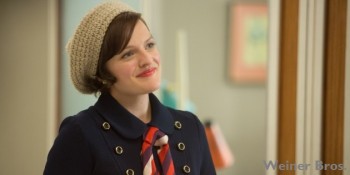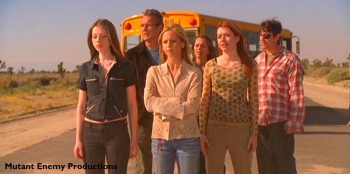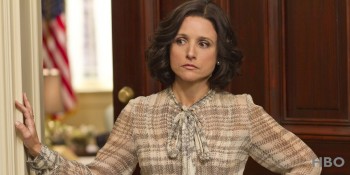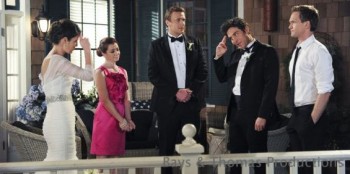Fanning out on the small screen has never been easier. I am taking a course on using film and media in the classroom. This week, I had to prepare a lesson on television to present to the rest of the class. Since I’m a big fan of television, I was excited to take on this assignment. (In fact, I volunteered for this particular topic.) One of the things I focused on in my presentation was how we watch and how much the experience of watching television has changed.
We can now watch TV anytime and anywhere; we are no longer obligated to watch a show at the time it originally airs or on our television. Even if you’re watching live when the show airs, you can pause the show or rewind at any point during the program with a DVR. If you can’t watch the show live, you can record it, watch it the next day OnDemand, download it from iTunes, or stream online through the station’s website or Hulu. You can catch up on entire seasons of shows via Netflix or Amazon. It’s heaven for fan*s like us.
The advent of streaming on Netflix and Amazon has really changed the way a lot of people view television. There are a lot of shows that I would love to watch, but I just don’t have enough time for while they’re on the air. It’s nice to know I can just wait for the season to come on Netflix to catch up.
This new reality even allows us to catch up on entire series after the fact. Now that all of Breaking Bad is available through Netflix, I plan to watch all five seasons this summer. At some point, I will also watch all of Mad Men (ending next year) and Chuck. Binge watching — spending hours watching entire seasons of a series online — has become extremely common now that shows are so accessible.
Availability isn’t the only change to how we view television now. The entire experience of watching TV has changed. Not only do we no longer feel the necessity to watch live, but we also divide our attention between the TV and various other forms of media while we’re watching. Texting, tweeting, updating Facebook — any number of activities now distracts us from the show we’re watching.
One of the most common ways many fans now experience their favorite shows is through social media. In fact, tweeting while watching television has become so prevalent that the Nielson Company announced in October it would begin measuring Twitter TV Ratings in addition to the normal ratings system.
Fans aren’t the only ones taking their viewing to a second screen. Series stars have started to live-tweet episodes and interact with fans while the show is on the air. This is a great way to encourage fans to watch live, so they can participate in the live-tweeting. Some celebrities even take the time to live-tweet shows they are not involved in — William Shatner and Orlando Jones have become particularly popular among the Supernatural fandom for their live-tweets, and Shatner has recently started live-tweeting Star-Crossed, which holds a special place in our hearts.
Lest they be left out of the chance to capitalize on additional exposure, the networks and series producers are getting in on the action. Many shows have official Twitter accounts that will tweet along with the show, and some even have Tumblr accounts where they will “live-blog” new episodes. This includes reblogging fan reactions and fan art, as well as photos and gifs the staff has prepared. It’s typically a good idea to avoid these official accounts if you’re not able to watch the show live, as spoilers in the form of gifs are usually posted in abundance.
Another way television shows encourage fan interaction on Twitter is through suggested #hashtags. This tactic can have positive and negative influences. In the bottom corner of a show, viewers can see a suggested hashtag for fans to tweet. This will help the show to become a trending topic on Twitter. The downside is that, occasionally, these suggested hashtags appear just before the action they refer to, thus warning viewers something is coming. This can lead to fans getting frustrated with the network for using the hashtags. However, I’m willing to bet the networks feel the good outweighs the bad.
The way we view television has also led to changes in who produces the shows we watch — and how. Netflix’s rise in popularity for viewing series led the service to begin funding their own shows, including the critically acclaimed Orange is the New Black and House of Cards. They also revived the sitcom Arrested Development for a fourth season. Netflix has proved itself a contender with the other networks when its shows were recently nominated for several Golden Globes and Emmy awards; House of Cards won three of the nine Emmys for which it was nominated.
Amazon has also begun distributing its own original content and, taking it a step further, has reinvented the pilot process for television content. Amazon has recognized the role consumers play in the success of a series, and therefore has created a viewer-centric pilot process. Instead of the typical method, in which a pilot is created and network executives make the decision whether or not the pilot will go to series, Amazon commissioned pilots for several potential series, then offered them all to be streamed for free on their site. Viewers were then asked to respond to several survey questions about their thoughts on the pilot they watched, in order to determine the interest in the show. Amazon is using the information from these surveys to make the final decision as to which pilots will receive a series order. One of the shows Amazon recently announced would be picked up for a series is The After, an intriguing pilot from The X-Files creator Chris Carter.
The availability and diversity now offered as a result of these advances makes it easier for people to watch much more television, even if they’re not watching when it originally airs. If there are four shows you want to see airing at the same time, you don’t have to worry about choosing among them. You can watch one, record another, then view the rest OnDemand (the Tuesday-at-8 p.m. time slot is a great example of putting this into practice, with Agents of S.H.I.E.L.D., The Originals, Glee, and NCIS all airing at the same time).
We have come a long way since television was originally invented. We can now watch whenever and wherever we want. It’ll be interesting to see how the way we interact with television continues to evolve in the future.




